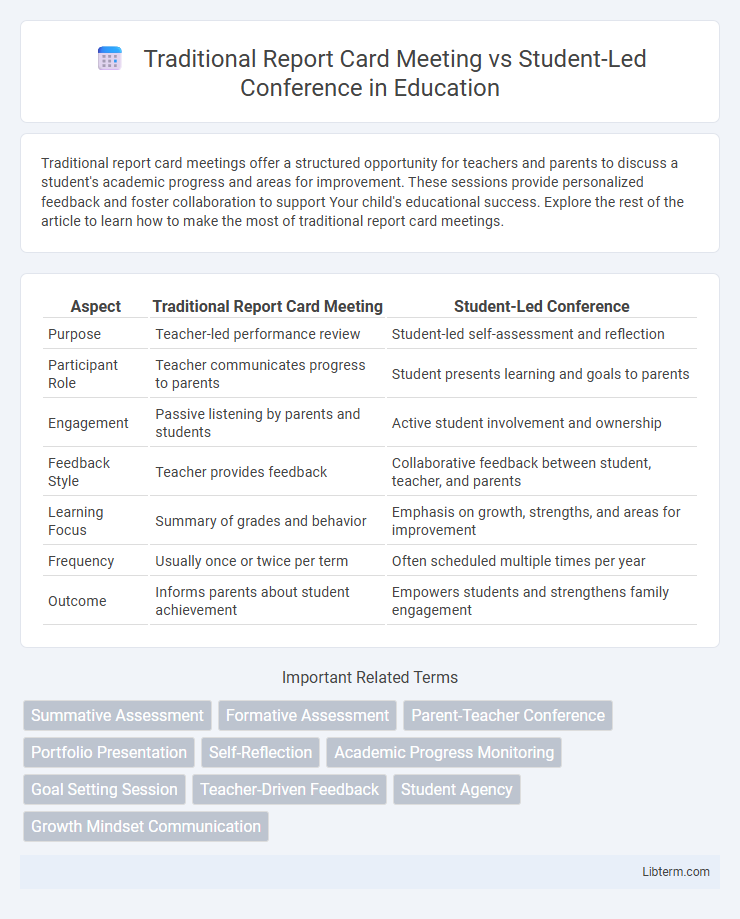Traditional report card meetings offer a structured opportunity for teachers and parents to discuss a student's academic progress and areas for improvement. These sessions provide personalized feedback and foster collaboration to support Your child's educational success. Explore the rest of the article to learn how to make the most of traditional report card meetings.
Table of Comparison
| Aspect | Traditional Report Card Meeting | Student-Led Conference |
|---|---|---|
| Purpose | Teacher-led performance review | Student-led self-assessment and reflection |
| Participant Role | Teacher communicates progress to parents | Student presents learning and goals to parents |
| Engagement | Passive listening by parents and students | Active student involvement and ownership |
| Feedback Style | Teacher provides feedback | Collaborative feedback between student, teacher, and parents |
| Learning Focus | Summary of grades and behavior | Emphasis on growth, strengths, and areas for improvement |
| Frequency | Usually once or twice per term | Often scheduled multiple times per year |
| Outcome | Informs parents about student achievement | Empowers students and strengthens family engagement |
Introduction to Traditional Report Card Meetings
Traditional report card meetings serve as structured, teacher-led sessions where educators present academic progress, behavior, and grades directly to parents. These meetings emphasize a formal review of standardized assessments and performance metrics, with limited student involvement. The focus remains on communication from teacher to parent, ensuring clarity on student achievement within set curriculum guidelines.
Understanding Student-Led Conferences
Student-led conferences empower students to actively participate in their academic progress by presenting their work and reflecting on their learning goals. This approach fosters deeper student engagement and accountability compared to traditional report card meetings where communication is primarily teacher-driven. Emphasizing student voice during these conferences enhances collaboration among students, parents, and teachers, leading to tailored support and improved educational outcomes.
Core Differences Between Meeting Types
Traditional report card meetings typically involve a teacher-driven presentation focused on academic performance and standardized assessment results, while student-led conferences prioritize active student participation, encouraging self-assessment and goal setting. The former centers on parent-teacher communication about grades, whereas the latter fosters a collaborative dialogue among students, parents, and educators to reflect on learning progress and personal growth. Core differences include the degree of student involvement, conference structure, and emphasis on developing self-regulation skills.
Benefits of Traditional Report Card Meetings
Traditional report card meetings offer clear, structured communication between teachers and parents, ensuring detailed feedback on student performance and progress. These meetings provide an opportunity for teachers to explain assessment criteria, address specific concerns, and establish goals collaboratively with parents. Face-to-face interaction in traditional meetings fosters trust and accountability, reinforcing the school's role in student development.
Advantages of Student-Led Conferences
Student-led conferences empower students by promoting ownership of their learning, enhancing communication skills, and fostering self-reflection. They create a collaborative environment where students, parents, and teachers engage in meaningful dialogue about progress and goals. This approach leads to greater student motivation and accountability compared to traditional report card meetings.
Parental Engagement in Both Approaches
Traditional report card meetings typically involve one-way communication where teachers update parents on student progress, limiting active parental engagement. Student-led conferences transform the dynamic by empowering students to present their learning, fostering deeper parental involvement and meaningful dialogue. Research indicates that student-led conferences enhance parental understanding and investment in their child's education compared to conventional meetings.
Impact on Student Motivation and Ownership
Traditional report card meetings often position students as passive recipients of grades, which can limit their engagement and sense of responsibility for learning. Student-led conferences empower learners to present their work, reflect on progress, and set personal goals, significantly boosting motivation and ownership of their academic journey. This active involvement fosters deeper self-awareness and encourages continuous improvement, driving long-term educational success.
Teacher Roles and Preparation
Traditional report card meetings require teachers to prepare detailed progress summaries and communicate assessment results directly to parents, emphasizing a one-way information flow. In student-led conferences, teachers serve as facilitators, guiding students to present their learning and reflections, which demands preparation in coaching students and structuring the conference framework. Both approaches involve distinct teacher roles and preparation efforts that impact engagement and communication effectiveness with families.
Common Challenges and Solutions
Traditional report card meetings often face challenges such as limited student involvement and one-way communication between teachers and parents, which can hinder engagement and personalized feedback. Student-led conferences address these issues by empowering students to actively present their learning progress, fostering deeper reflection and collaboration among students, parents, and teachers. Common solutions include preparing students with presentation skills, scheduling adequate time for meaningful dialogue, and providing clear guidelines to ensure focused and constructive discussions.
Choosing the Best Approach for Your School
Traditional report card meetings emphasize teacher-led discussions focusing on student grades and behavior, providing a structured overview for parents. Student-led conferences prioritize student ownership by involving learners in presenting their progress and setting goals, fostering engagement and self-reflection. Schools should assess their community's needs, student maturity, and desired outcomes to select the most effective format that promotes collaboration and meaningful communication.
Traditional Report Card Meeting Infographic

 libterm.com
libterm.com